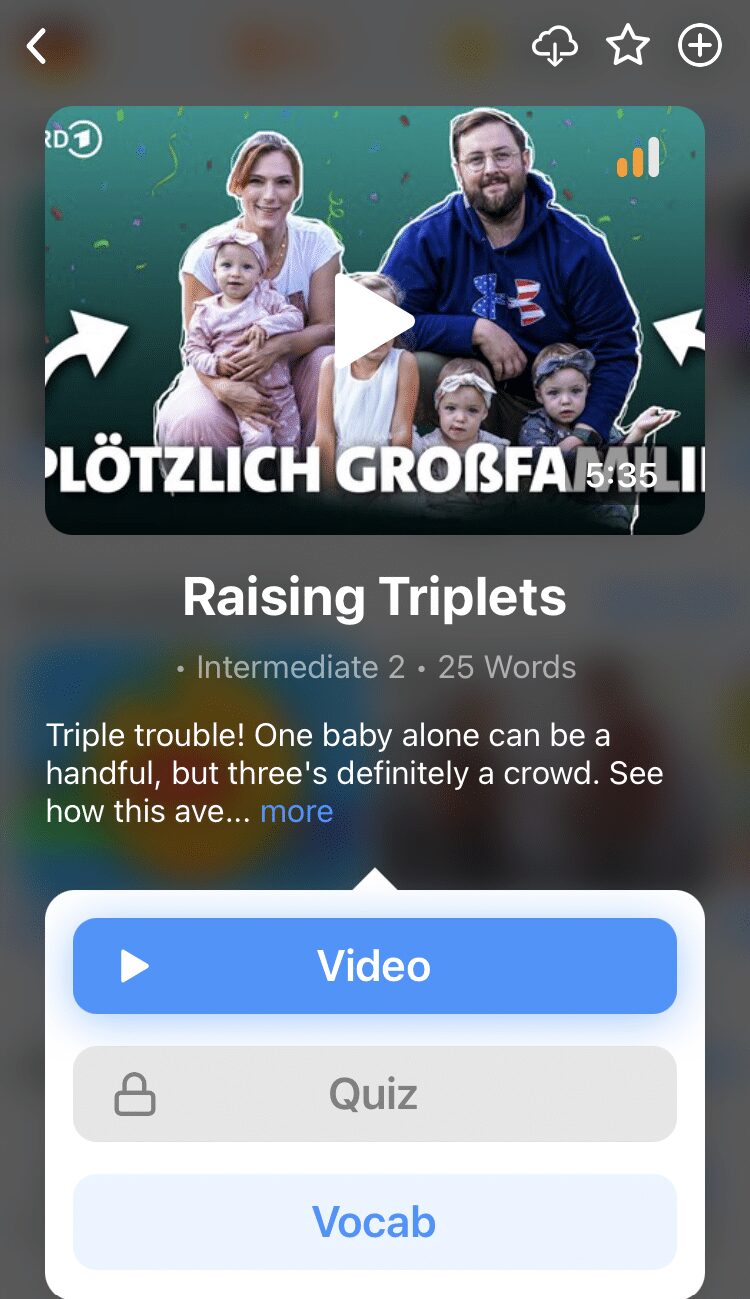German Prefixes: 3 Types and Usage Notes

German prefixes are divided into three categories: Trennbar (separable), untrennbar (inseparable) and dual—which function as both separable and inseparable depending on context.
Understanding the general meanings of these prefixes and how they affect the verbs to which they are attached is essential for success in the German language, be it in speaking, listening, reading or writing.
While there is, for the most part, no perfect translation for German prefixes, some do follow patterns that can help you translate the meanings of verbs with added prefixes. Let’s break down each of these categories of prefixes and so you can use them right away.
Download: This blog post is available as a convenient and portable PDF that you can take anywhere. Click here to get a copy. (Download)
1. Trennbare Präfixe (Separable Prefixes)
Separable prefixes are, in my opinion, the toughest of the three types. Verbs with separable prefixes will appear in conversation and writing before the actual prefix, which tricks you into thinking the verb means one thing until the very end of the sentence—when you finally encounter the prefix and uncover the true meaning.
Perhaps nobody understood this difficulty better than Mark Twain, whose now infamous “The Awful German Language” provides an analysis of German separable prefixes:
“The Germans have another kind of parenthesis, which they make by splitting a verb in two and putting half of it at the beginning of an exciting chapter and the other half at the end of it. Can any one conceive of anything more confusing than that? These things are called ‘separable verbs.’ The German grammar is blistered all over with separable verbs; and the wider the two portions of one of them are spread apart, the better the author of the crime is pleased with his performance.”
While Twain’s analysis of German grammar may be from an American viewpoint, it does echo some of the hardships anyone who wants to learn German may face. Verbs that stretch for sentences, even paragraphs, are the scourge of beginners to seasoned pros.
Verbs with separable prefixes are also very widely used in German. They function as such: The prefix separates from the verb stem (which is conjugated as if it were a normal, standalone verb) and then is dropped at the end of the sentence or clause. In spoken German, the separable prefix is stressed.
Das Pferd steigt ohne Angst in das Flugzeug ein. (Without fear, the horse boards the airplane.)
Zur Beerdigung bringt die alte Frau ihren Lieblingskuchen mit. (The old woman brings her favorite cake to the funeral.)
In the perfect past tense, the verb stem and its prefix are sent to the end of the clause, with the auxiliary verb haben or sein going at the beginning. To form the past participle, the usual ge- is placed between the separable prefix and the verb.
For example, the verb aufräumen (to tidy up, to clean up) becomes aufgeräumt in the perfect tense.
Die Kinder haben das Zimmer aufgeräumt. (The children tidied up the room.)
Common Separable Prefixes
Be aware that the approximate translations given below will not work 100% of the time, and your best bet at achieving success is to simply memorize the meanings of words.
| Separable Prefix | Explanation | Examples |
|---|---|---|
| An | Similar to the English "to" or "from" | schauen
— to look anschauen — to look at/examine kommen — to come ankommen — to arrive |
| Auf | Can sometimes mean "up" or "on" | machen
— to make aufmachen — to open stehen — to stand aufstehen — to stand/get up |
| Aus | Most often means "out" or "from" | führen
— to lead ausführen — to execute/perform kommen — to come auskommen — to come out |
| Ein | Means "in" or sometimes "down" | drücken
— to press eindrücken — to press in/dent atmen — to breathe einatmen — to inhale |
| Mit | Means "with" | kommen
— to come mitkommen — to come with machen — to make, to do mitmachen — to do with |
| Nach | Can mean "after" or function like the English prefix "re-" | gehen
— to go nachgehen — to pursue/trace füllen — to fill nachfüllen — to refill |
| Zu | Harder to translate, but can mean "to" | geben
— to give zugeben — to admit/confess lassen — to let zulassen — to authorize |
As mentioned, you can’t always rely on these translations. However, for verbs like kommen , machen and spielen that can take several different meanings and prefixes, knowing the rough translations of the prefixes can do wonders.
2. Untrennbare Präfixe (Inseparable Prefixes)
OK. We are through with the hardest part. Let out a sigh of relief and pat yourself on the back!
Inseparable prefixes function in the same way as separable prefixes, only the prefix remains attached to the verb. This makes it a lot easier to identify the full verb, particularly in conversation or while listening. Unlike separable prefixes, inseparable prefixes are not stressed when spoken.
Ich erkenne diesen Stadtteil. (I recognize this part of the city.)
In the perfect tense, verbs with inseparable prefixes do not take the normal ge-. They rather keep their prefix, and gain the -t ending after the stem. Look at this example with the verb ertappen (to catch):
Wir haben ihn auf frischer Tat ertappt! (We caught him red-handed!)
If the stem verb is irregular, however, remember to still use the irregular past participle, just replacing the -ge with the inseparable prefix. Let’s look at this example with erkennen , coming from kennen , which has an irregular past participle of gekannt :
Ich habe ihn nicht erkannt. (I didn’t recognize him.)
Common Inseparable Prefixes
| Common Inseparable Prefix | Explanation | Examples |
|---|---|---|
| Be | This one makes the verb take a direct object and can sometimes function like the English "be-." | kommen
— to come bekommen [+ direct object] — to receive sprechen — to speak besprechen — to discuss |
| Emp | This is a tricky one, but usually has to do with reception/perception. | fehlen
— to miss, to lack empfehlen — to recommend finden — to find empfinden — to feel, to perceive |
| Ent | This usually makes the verb do the opposite of its stem. | arten
— to develop, to become entarten — to degenerate werten — to evaluate entwerten — to void |
| Er | This can function in a couple of different ways: Sometimes, it acts like the English "re-" and other times it signals the completing of an action, particularly if that action can end in death. | kennen
— to know erkennen — to recognize schießen — to shoot erschießen — to shoot dead |
| Ge | Unfortunately, this one seldom has a consistent translation. Also, it can trick beginners into thinking it is a past participle. To check this in some contexts, you can see whether there is already an auxiliary haben or sein . If there isn't, then it is probably a verb with the inseparable prefix ge-. | gewinnen
— to win Sie gewinnt. (She wins.) Notice that we see ge- but there is no auxiliary verb. Sie hat gewonnen. (She won.) |
| Miss | Thankfully, this is an easy one to remember, as it functions similarly to the English "mis-." | brauchen
— to need missbrauchen — to misuse trauen — to trust misstrauen — to mistrust |
| Ver | When added, this one often, but not always, causes the verb to do the opposite of its stem. | kaufen
— to buy verkaufen — to sell bieten — to offer verbieten — to forbid |
| Zer | Those with an appetite for destruction will easily remember that zer- almost always causes a verb to signify zerstören (demolition or destruction) of something. | reisen
— to travel zerreißen — to shred, tear up beißen — to bite zerbeißen — to gnaw, bite in two |
Inseparable prefixes are going to be harder to find a consistent translation for, although these patterns can help. As mentioned, the only sure-fire way to succeed is to memorize, memorize, memorize!
3. Dual Prefixes
Speaking of memorization, the third type of prefix almost exclusively requires memorization.
Dual prefixes take prepositions as the prefix, so knowing the meaning of prepositions like hinter (behind), über (above), um (around), unter (down or below), wider (against) and wieder (again) will guide you to translating the meaning of the verb.
For dual prefixes, you need to memorize whether the preposition is inseparable or separable. A handy way of telling the difference, however, is to listen to how the word is pronounced:
If the prefix is stressed, it is separable:
sich umschauen (To look around)
Ich schaue mich um. (I look around.)
If the prefix is unstressed, it isn’t separable, and always sticks with the verb stem:
übersehen (To overlook/ignore)
Ich übersehe seinen Fehler. (I overlook his mistake.)
A couple of verbs with these prefixes even have both separable or inseparable forms, and the meaning changes depending on whether you use the separable or inseparable form.
Some of these changes can even be quite significant, like in the case of umfahren . Notice the stark change in meaning, and how this affects how you construct the sentence in the present and past tenses.
Inseparable:
- Ich umfahre das Fahrrad. (I drive around the bicycle.)
- Ich bin das Fahrrad umfahren. (I drove around the bicycle.)
Separable:
- Ich fahre das Fahrrad um. (I run the bicycle over.)
- Ich bin das Fahrrad umgefahren. (I ran the bicycle over.)
How to Practice German Prefixes
Learning to use the different types of prefixes will deepen your speaking and writing abilities while also adding to your vocabulary.
As you use verbs with prefixes, you will notice patterns to help you remember how the prefixes change the meanings of the verbs. And once you notice these patterns, using German prefixes will become much easier.
A good tip is to listen to these over and over. Once you know how the prefixes should sound, they’ll come more naturally to you.
I definitely recommend Deutsche Welle as a starting point. On this well-known German news website, you can find podcasts, videos and other content to listen to native speakers using these prefixes in action.
Another place where you can find authentic content is FluentU.
FluentU takes authentic videos—like music videos, movie trailers, news and inspiring talks—and turns them into personalized language learning lessons.
You can try FluentU for free for 2 weeks. Check out the website or download the iOS app or Android app.
P.S. Click here to take advantage of our current sale! (Expires at the end of this month.)
With resources like these, you can learn and practice German prefixes on your own.
Once you have a good understanding of these prefixes, then it’s time to use them! A good way to do this is by writing sentences that feature what you want to learn. You’ll find that actually writing out what you’re learning can help you remember and learn the information better.
The most important thing to remember is that there is never a sure-fire way to “guess” the meaning of a verb with a prefix, and while there are patterns, only practice will truly make perfect.
Viel Glück! (Good luck!)
Download: This blog post is available as a convenient and portable PDF that you can take anywhere. Click here to get a copy. (Download)
And One More Thing...
Want to know the key to learning German effectively?
It's using the right content and tools, like FluentU has to offer! Browse hundreds of videos, take endless quizzes and master the German language faster than you've ever imagine!
Watching a fun video, but having trouble understanding it? FluentU brings native videos within reach with interactive subtitles.
You can tap on any word to look it up instantly. Every definition has examples that have been written to help you understand how the word is used. If you see an interesting word you don't know, you can add it to a vocabulary list.
And FluentU isn't just for watching videos. It's a complete platform for learning. It's designed to effectively teach you all the vocabulary from any video. Swipe left or right to see more examples of the word you're on.
The best part is that FluentU keeps track of the vocabulary that you're learning, and gives you extra practice with difficult words. It'll even remind you when it’s time to review what you’ve learned.
Start using the FluentU website on your computer or tablet or, better yet, download the FluentU app from the iTunes or Google Play store. Click here to take advantage of our current sale! (Expires at the end of this month.)












